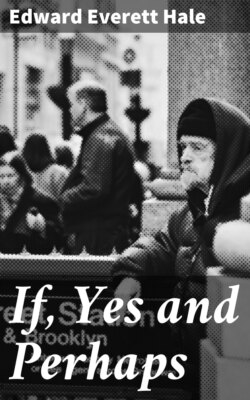Читать книгу If, Yes and Perhaps - Edward Everett Hale - Страница 4
На сайте Литреса книга снята с продажи.
THE CHILDREN OF THE PUBLIC.
ОглавлениеTable of Contents
[This story originated in the advertisement of the humbug which it describes. Some fifteen or twenty years since, when gift enterprises rose to one of their climaxes, a gift of a large sum of money, I think $10,000, was offered in New York to the most successful ticket-holder in some scheme, and one of $5,000 to the second. It was arranged that one of these parties should be a man and the other a woman; and the amiable suggestion was added, on the part of the undertaker of the enterprise, that if the gentleman and lady who drew these prizes liked each other sufficiently well when the distribution was made, they might regard the decision as a match made for them in Heaven, and take the money as the dowry of the bride. This thoroughly practical, and, at the same time, thoroughly absurd suggestion, arrested the attention of a distinguished story-teller, a dear friend of mine, who proposed to me that we should each of us write the history of one of the two successful parties, to be woven together by their union at the end. The plan, however, lay latent for years—the gift enterprise of course blew up—and it was not until the summer of 1862 that I wrote my half of the proposed story, with the hope of eliciting the other half. My friend's more important engagements, however, have thus far kept Fausta's detailed biography from the light. I sent my half to Mr. Frank Leslie, in competition for a premium offered by him, as is stated in the second chapter of the story. And the story found such favor in the eyes of the judges, that it received one of his second premiums. The first was very properly awarded to Miss Louisa Alcott, for a story of great spirit and power. "The Children of the Public" was printed in Frank Leslie's Illustrated Newspaper for January 24 and January 31, 1863. The moral which it tries to illustrate, which is, I believe, an important one, was thus commended to the attention of the very large circle of the readers of that journal—a journal to which I am eager to say I think this nation has been very largely indebted for the loyalty, the good sense, and the high tone which seem always to characterize it. During the war, the pictorial journals had immense influence in the army, and they used this influence with an undeviating regard to the true honor of the country.]
